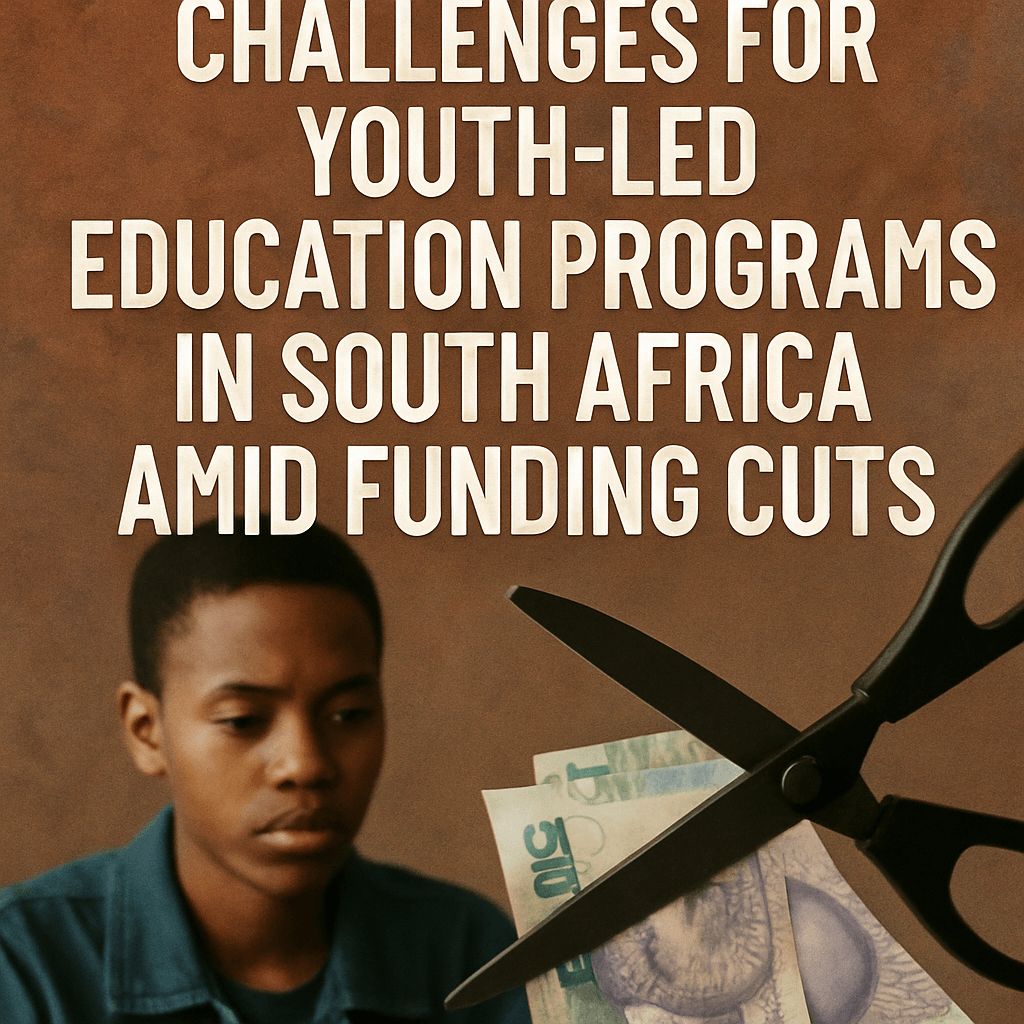Challenges for Youth-Led Education Programs in South Africa Amid Funding Cuts

In the township of Philippi, located in the Western Cape province of South Africa, a group of committed young volunteers is spearheading an initiative to combat HIV/AIDS through innovative mobile clinics. One of these volunteers, 24-year-old Simamkele Matinise, emphasizes the importance of creating a welcoming environment for the youth. “It’s more friendly for the youth,” she remarked in a recent interview with Fortune. “It provides a safe environment for us.”
Overview of the Mobile Clinic Initiative
The mobile clinics, characterized by vibrantly decorated trucks emblazoned with the words, “Don’t delay. Get protected today!”, serve as a beacon of hope for many in this tight-knit community. Positioned strategically at the village’s entrance, these clinics are physically accessible to residents and are designed to alleviate the stigma often associated with traditional health services.
This initiative falls under the auspices of the Desmond Tutu Health Foundation, which has been instrumental in the fight against HIV/AIDS in the region. Initial funding from the Bills and Melinda Gates Foundation allowed the foundation to develop effective strategies for HIV education and prevention in areas where the disease burden is notably high. As of now, South Africa harbors over 7.5 million individuals living with HIV, the highest concentration globally.
The Urgent Need for HIV Prevention
With a staggering number of individuals affected, the urgency for effective interventions, especially among vulnerable populations such as young girls, is paramount. Elzette Rousseau, a social and behavioral scientist at the foundation, articulated the philosophy that access to healthcare should be about proximity, noting, “Access shouldn’t lie with the individual in seeking care, but with how close you can bring services to the person.” This shift in thought is reflected in the design of their mobile clinic services.
Services Offered by the Mobile Clinics
The mobile clinic program offers a comprehensive set of services, including:
- HIV Testing: Confidential testing services to individuals of all ages.
- Education on HIV: Information disseminated in an interactive and engaging manner.
- PrEP Distribution: Various preventive methods are provided, including:
- Oral PrEP: A daily pill that reduces HIV transmission risk.
- Injectable PrEP: A long-acting injection administered every two months.
- Dapivirine Vaginal Ring: A new form of protection released once a month.
Matinise, who also works part-time in a local shop, has embraced the knowledge gained through her involvement, sharing the options available to her community: “I was excited because you have to protect yourself. You can never know. Tomorrow you might be raped.”
Addressing Stigma Through Community Engagement
The cultural sensitivity in delivering health care is crucial for the program’s success. Many individuals, particularly young men and women, harbor fears about visiting traditional clinics, often avoiding them due to stigma. Nomathemba Chandiwana, the chief scientific officer at the foundation, argues that preconceptions about HIV can deter people from accessing necessary care. She states, “Many young men and women fear going to the traditional government clinic, where they have to stand in long lines behind massive ‘HIV’ signs to get tested. You’ve got to go to them.”
The Impact of Recent Funding Cuts
Despite the success of the FastPrEP project, external funding streams remain precarious. Following recent federal actions, including Executive Orders from the U.S. administration aimed at reorienting foreign aid policy, there is considerable concern for the durability of programs like those initiated by the Desmond Tutu Health Foundation. Although initial funding from the Gates Foundation for this specific project remains, their reliance on grants from the National Institutes of Health (NIH) and other sources puts them in jeopardy as discussions surrounding terminations arise.
Moreover, funding cuts extend beyond individual projects and threaten the entire global health landscape. Despite HIV infections markedly decreasing by 60% since the mid-1990s, approximately 40 million people still live with the virus, with around 600,000 annual deaths attributable to the disease as of 2023.
Global Implications of Funding Insufficiencies
The ramifications of reduced funding could extend further. Current discussions about the future of the President’s Emergency Plan for AIDS Relief (PEPFAR) underscore this uncertainty. Launched in 2003 with bipartisan support, PEPFAR has invested over $110 billion globally in HIV/AIDS response. Should funding cuts proceed, health experts project that over 6 million individuals could lose access to vital resources in the coming four years.
Community Resilience and Future Aspirations
Despite these challenges, community leaders maintain a hopeful outlook. “This money has been put to such good use around the world,” says Bekker, “and I have great hope for my continent … we’ll prevail.” The focus on youth-led initiatives is evidence of a growing recognition that sustainable health care solutions must be community-driven. With monthly consultations among over 60 program participants to refine and improve service delivery, inclusivity is built into the heart of this project.
For young activists like Solatho Manjati, who dreams of becoming a health minister one day, the work is about fostering empowerment, offering individuals choices to safeguard their health. In light of the uncertainty surrounding future funding, he states, “If it didn’t exist, it would mean that there would be a barrier for people accessing healthcare services.”
Conclusion: The Importance of Collaborative Governance
As noted by Melinda French Gates in a recent interview, effective global health solutions demand local insights: “We can’t devise things from Seattle or New York and expect that they’re just going to sail out into the community.” Efforts to bridge communication and strategy between local communities and global health leaders are crucial. Listening, adapting, and ensuring sustained funding will be essential to protect the lives of those vulnerable to HIV/AIDS in South Africa and beyond.
Source: fortune